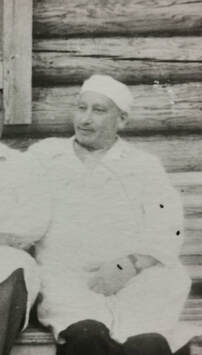 The Gulag was the largest network of forced labour camps ever created, spanning thousands of miles across the Soviet Union. Around 18 million prisoners, possibly more, were sent to the Gulag from 1930 to 1953 during the rule of Joseph Stalin, of whom up to three million died in the camps or as a result of their incarceration. As well as criminals, the Gulag became home to huge numbers of political prisoners. One of these was Yehuda Solomonovich Kaufman, the husband of my great-grandfather’s sister Miriam (Mira) – whose story I have been telling in my blog over the last few weeks – and grandfather to my cousin Irina (Ira), who has shared her family stories with me. Yehuda, originally from the town of Bobruisk in today’s Belarus, was arrested no less than three times before finally being sent to the Gulag in 1938. The first was in the 1920s when he was arrested as a Jewish nationalist because he gave private Hebrew lessons, in addition to his professional work as a surgeon. His next arrest came in 1931, this time because he corresponded with several members of his family (brothers, a nephew) who lived abroad. He was sent to prison, missing the birth of his daughter Sulamia as a result. In 1936-37 Yehuda’s nephew came to Kiev from overseas to visit, and after this he was arrested for a third time and sentenced to ten years in a labour camp in Krasnoyarsk region as an ‘enemy of the people’. Although conditions were harsh and his sentence was long, he was lucky in being able to work as a doctor, and like many inmates, he even had a ‘prison wife’. In 1949 Yehuda was finally permitted to return to Kiev. He left his prison wife to return to Mira, but no sooner had he set foot in his apartment for the first time in more than a decade than a group of state security agents arrived to arrest him once again. Rather than sending him back to the Gulag or to Siberia, he was exiled to the town of Zvenygorodka in Cherkasy province, central Ukraine, where he remained until his eventual release in 1956. Ira, who was born in 1952, recalls that as a little girl, her family told her that Grandpa was “in Paris”. But later she remembers visiting him in Zvenygorodka, in a room with a round table and a bed with springs, which she would use as a trampoline. Stalin died in 1953, and the Soviet reign of terror came to an end. But the truth of the labour camps, the mass deportations, executions and purges did not become public until Nikita Khrushchev cemented his place at the head of the Communist Party in the power struggle that followed Stalin’s death. Khrushchev’s so-called ‘secret speech’ to party officials in February 1956 denounced Stalin’s excesses and heralded a period of liberalisation, during which thousands of prisoners - including Yehuda – were set free and rehabilitated. Once he was finally back in Kiev after 18 years of separation from his family, Yehuda managed to return to his work as a surgeon and to put the experiences of the previous two decades behind him. He was a cheerful man, loved by friends, family and colleagues alike, who rejoiced in his family and in life in general. He built up a strong relationship with his daughter in spite of their long years apart, and doted on his grandchildren, giving them little presents every day. He even wrote stories about his childhood that he illustrated himself. He died in 1964. Although life improved for the people of the Soviet Union under the so-called ‘Khrushchev thaw’, the discrimination and anti-Semitism that hounded Jews first under the Tsars and then under the Communists did not go away. Religion had been abolished after the October Revolution of 1917, so Judaism was no longer considered a religion but a nationality, marked in Soviet passports on the personal details page under the notorious point number five: Национальность – Eврей (Nationality – Jewish). This opened Jews up to any and every form of discrimination and anti-Semitism, from being humiliated in the street and called a Yid, to being marked down in exams, denied a place at university, overlooked for a promotion. So Jews kept quiet about their ‘nationality’. Parents were afraid to teach their children Yiddish, to follow the traditions that their people had lived by for thousands of years, to celebrate the Jewish holidays, and so the Yiddish language and Jewish customs died out, although small pockets remained in smaller towns and rural communities. “We were a typical Soviet family,” my cousin Ira says. “Nothing remained of our Jewishness except our surname and an entry in our passport.” As a child, she and her sister Mila wanted to blend in, to be like everyone else. Their parents didn’t talk to them about their ‘nationality’, nor later did they ever discuss it with their children. It wasn’t until the Soviet Union collapsed in 1991 that Jews were permitted to emigrate, in a bid for freedom from discrimination. Hundreds of thousands left, mostly for Israel, but also for the United States and Germany, where Ira and her family now live.
0 Comments
|
Keeping stories aliveThis blog aims to discuss historical events relating to the Jewish communities of Ukraine, and of Eastern Europe more widely. As a storyteller, I hope to keep alive stories of the past and remember those who told or experienced them. Like so many others, I am deeply troubled by the war in Ukraine and for the foreseeable future, most articles published here will focus on the war, with an emphasis on parallels with other tumultuous periods in Ukraine's tragic history. Archives
March 2024
Categories
All
|
 RSS Feed
RSS Feed
